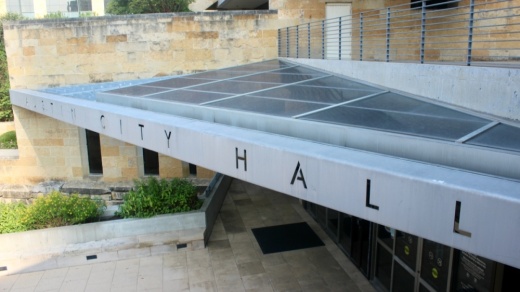Among the other items approved were a broad new city climate plan, homelessness and public safety contracts, and a challenge Texas' Senate Bill 8.
Senate Bill 8: the 'heartbeat' bill
A resolution sponsored by District 8 Council Member Paige Ellis and eventually passed in a 10-1 vote formalized council's opposition to SB 8, the state "heartbeat" bill restricting abortions after about six weeks of pregnancy. The statement also called for Cronk and the city law department to join state and federal legal challenges to SB 8.
The resolution's passage came one day after Ellis and other city and county leaders held a press conference at City Hall to speak on the bill and their support for reproductive rights.
“I sponsored this resolution because it really does take every one of us at all levels of government to come together and fight this egregious law. ... We appreciate Travis County joining the legal battle with amicus support; now it’s our turn," Ellis said.
Public safety, social service contracts
Several dozen city spending items related to homelessness services and policing were also approved by council Sept. 30. They total several millions of dollars directed from both the city budget and outside grant programs, and they range from housing and shelter services for people experiencing homelessness to funding for crime research and ammunition purchase.
The slate of contracts was authorized one week after a city auditor report found that Austin has "no complete inventory of agreements and associated spending" on homelessness after reserving nearly $180 million to such efforts over the past three fiscal years. A city spokesperson said staff are looking to improve how homeless initiatives are logged going forward, although a new system is not yet in place.
"We are working to identify options in our financial system that will unify tracking of all contracts that involve homelessness response so that we can comprehensively track our spending across all city departments. We hope to have a solution in place soon," the spokesperson said.
Metrics including a count of people leaving homelessness and moved into housing, the number of new housing units constructed and diversions from the criminal justice system are tracked to determine the program's success, according to the city—although officials also asked for more details going forward.
“We should start better identifying the information and data that we want and expect to be used as part of these contracts," Mayor Steve Adler said.
One of the new contracts, a $240,000 pull from Austin Public Health's budget, will be used for a yearlong planning and research effort with the nonprofit Social Finance aimed at updating how the city sets up its homelessness agreements.
"The resolution will engage Social Finance to support the city of Austin’s efforts to improve our solicitation process and implement new performance-based measures for contracting. ... This work will ensure that city resources are being used efficiently and effectively in the homelessness response," the spokesperson said.
The city is also planning to broaden its reach in the homelessness service sector by spending more than $100 million in American Rescue Plan Act funds over the next year, although the breakdown of that spending has yet to be finalized.
Most of the Sept. 30 contract items were renewals of existing agreements for the new fiscal year and do not change the assigned scope of work. The Ending Community Homelessness Coalition, Integral Care, Front Steps, Caritas of Austin, Foundation Communities and The Salvation Army were among those funded Sept. 30.
Other service contracts approved by council Sept. 30 provide funding for youth and abuse survivors.
Planning to reduce emissions
The Austin Climate Equity Plan and a related resolution were also passed Sept. 30, following a briefing on the plan to council members during their Sept. 28 work session. The plan cuts a decade off the city's previous goal for reaching net-zero greenhouse gas emissions through strategies stakeholders said were designed to ensure racial and economic equity along the way. Council members supportive of the measure highlighted the plan's focus on equity issues, transportation and more rapidly addressing environmental concerns in the city.
“What this climate plan does is recognize in a way we haven’t before that how we get there is just as important as the strategies and goals that we’ve laid out," District 10 Council Member Alison Alter said.
The plan's passage was accompanied later in the day by council approving an Alter-sponsored resolution laying out how the city will work to implement the climate goals. That direction will require Cronk or city staff to regularly report to council on the plan's progress and give residents opportunities to provide feedback as the process continues.
In addition to the climate plan's headline emissions goal—which city staff said will be backed up in the future by additional strategy and funding details—council members also spoke to their views on the importance of the framework's equity component given the disparate effects of climate change felt throughout Austin.
"Low-income and communities of color disproportionately bear the brunt of the impacts from climate change. In District 2, we are reminded of this as we near the anniversary of the Halloween floods in which homes were destroyed and lives were lost," District 2 Council Member Vanessa Fuentes said in a statement. "With the passing of the Climate Equity Plan, we’re doubling down on environmental justice."





